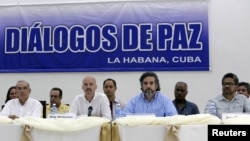Colombia's Marxist FARC rebels said an increase in violence by paramilitary groups made it harder to reach a final peace accord with the government as the two sides met for a round of negotiations in Cuba on Wednesday.
The FARC and the government reconvened after a two-week break, having made progress in more than three years of talks in Havana but missing a self-imposed March deadline over the issue of how to disarm the rebels.
The rebels fear for their safety once an accord is signed, saying a show of force by a uniformed criminal gang made up of former paramilitary fighters was aimed at disrupting the peace process.
The gang, known as the Urabenos, forced schools and businesses to close in a large swathe of Colombia for two days last week, killing five people.
"With paramilitary groups, with crime and attacks, with terror and threats peace cannot materialize," Revolutionary Armed Forces of Colombia (FARC) commander Pablo Catatumbo said, reading from a statement that demanded an agreement be quickly reached about safety guarantees.
Violence in Colombia is at the lowest level in 50 years, partly thanks to a unilateral ceasefire in which FARC reduced attacks and kidnappings. But murders of social leaders, union members and political activists rose 35 percent last year, according to data from the CERAC research group, which tracks the conflict that has endured for half a century.
In the 1980s hundreds of former FARC soldiers were killed by paramilitary groups when they laid down their weapons to join democratic politics. Fears of a repeat have hardened the guerrillas' resolve not to disarm until they feel sure of their safety, complicating the talks hosted by Cuba.
In a newspaper interview, Colombia's defense minister last week said the rebels were using "the ghost of paramilitarism" as a delaying tactic.
Colombia's right-wing armed groups were officially disbanded between 2003 and 2006 and the government does not recognize their heirs as paramilitary organizations.
President Juan Manuel Santos has said that once peace is achieved, he will put all his resources into fighting gangs such as the Urabenos.
The United Nations Office of the High Commissioner for Human Rights in March warned such "post-mobilization armed groups" were a threat to the implementation of peace and called the government to respond effectively.
"Paramilitarism is no ghost invoked by the insurgency," the FARC said in its statement.





